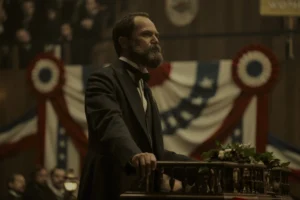Summary
An important and timely documentary, Rocking the Couch features a few questionable interviews but is genuinely affecting where it allows women in Hollywood to discuss their experiences with sexual assault.
Rocking the Couch, directed by Minh Collins, explores the well-known Hollywood phenomenon called the casting couch, where coercion and rape are perpetrated and consistently covered up by men throughout Hollywood. The term “casting couch” has existed almost as long as Hollywood itself — the practice of would-be stars sleeping with power players in exchange for acting roles. While some people (specifically, one or two people interviewed for this film), might try to handwave the sex for fame agreement as a transactional arrangement that isn’t actually hurting anyone, there’s almost always a predatory element to this very unethical power imbalance.
The filmmakers here have chosen to center their narrative on the case of Wallace Key, a Hollywood talent agent accused of sexual misconduct by several different women and was finally sent to prison in the early 90s.
To be honest, the film dedicates a confusing amount of time to this case — it’s clear that it’s meant to be the unifying element that ties all the interviews together, but there are also a lot of individual stories of sexual harassment unrelated to this trial, and even historical examples. The infamous Fatty Arbuckle scandal and the mystery of Natalie Wood’s as yet unverified rapist from her days as a young actress are both briefly featured here.
These stories are all fascinating, but they have the effect of making the film come across as a bit unfocused. Rocking the Couch further muddies the waters by including interviews that exist only to imply that there’s some room for interpretation to the casting couch scenario, where women are getting something out of it too, so where’s the real harm? When they have so many compelling and devastating interviews with actresses speaking poignantly about the abuse that has had a severely negative impact on not only their careers but their lives in general, there doesn’t seem to be much point in entertaining a devil’s advocate.
I don’t know that it’s worthwhile to bring in Carrie Mitchum, for example, who suggests that the women who ended up in these situations knew what they were doing, even though by her own admission she was protected as the granddaughter of Robert Mitchum, still a major Hollywood player that no one wanted to mess with when she was starting her career.
And to be frank, the film could only have been improved without the pretentious ramblings of actor/producer Pritesh Shah, who insists that he would never take advantage of women like that on the grounds that it’s a dick move, but if they’re into it, it’s not that bad, right? I imagine that this was an attempt to present a balanced approach and acknowledge a potential grey area between a supposedly consensual transaction and far more nefarious sexual assault. But all it really accomplishes is muddying the central thesis of the film.
Rocking the Couch is at its best when it allows the victims to speak for themselves. It’s horrifying to listen to their stories, how clearly affected they still are, and how some of them still seem to hold themselves at least partially responsible for being caught in such a vulnerable position. And the saddest part is how many of them ended up leaving the industry because they couldn’t take it anymore. How many potentially wonderful actresses film has been deprived of because so many men with power in Hollywood feel that their desire for sex is somehow more important than women being able to go to work in a safe environment. This element of the film makes Rocking the Couch an important and timely documentary, one worth watching despite its flaws.




